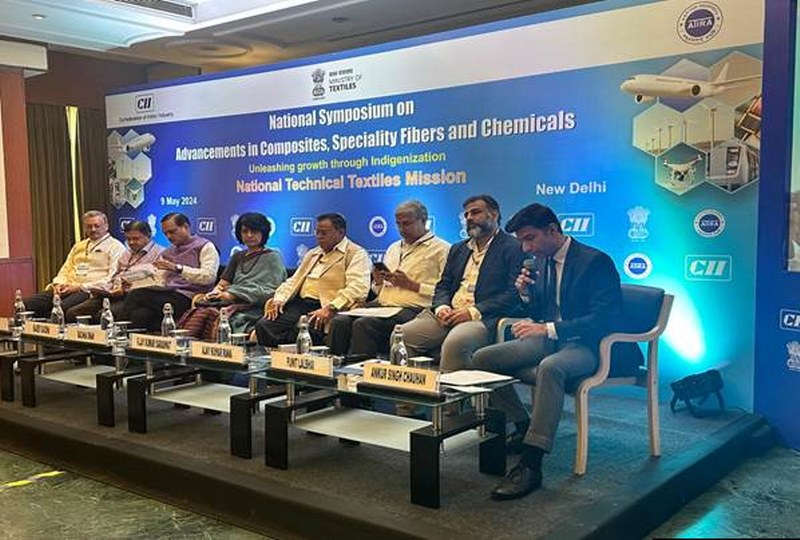
India’s Technical Textiles market has huge potential backed by a significant growth rate of 10%: Textiles Secretary
New Delhi: India’s Technical Textiles market has a huge potential backed by a significant growth rate of 10% and placement as the 5th largest technical textiles market in the world, said Rachna Shah, Secretary, Ministry of Textiles while addressing a symposium on Thursday.
She was speaking at National Symposium on Advancements in Composites, Speciality Fibres and Chemicals in New Delhi organised by the Ministry of Textiles in partnership with Confederation of Indian Industry (CII) and Ahmedabad Textiles Industries’ Research Associations (ATIRA).
She noted that composites have distinct structural and physical features, which make them suitable for specific applications across various sectors.
For example, in infrastructure development, aerospace, automotive sector, Military and Defence sector, medical devices, composite materials, among others.
She highlighted the significance and importance of institutional buyers, user Ministries and industries in the adoption of technical textiles and products made out of specialty fibres and composites.
A collaborative approach among stakeholders including industry representatives, policymakers, researchers, and investors is imperative to address the cost implications in the field of composites and specialty fibres and work together in increasing awareness and education for wider adoption by the larger community for the growth of the sector, she added.
NITI Aayog Member Vijay Kumar Saraswat highlighted that the specialty fibres are the building blocks of the advanced composites and its choice is a strategic decision on a blend of performance requirements and cost consideration.
He mentioned that specialty fibres like aramids, carbon fibre, zylon, ultra-high molecular weight polyethylene (UHMWPE), glass fibre, ceramic fibre can be tailored for diverse applications and strategic needs, such as Fire Retardant fabrics, Bullet Resistant Jackets, ropes and cables, windmills (renewable energy) and in gas and chemical filtration respectively.
He highlighted the top trends in composite materials including but not limited to high performance resins and adhesives, carbon fibre based materials light weighting advanced polymer composites, biomaterials, nanocomposites, intelligence design and manufacturing.
He elucidated the advancements in material science are not just about creating stronger or lighter materials, but also about ensuring their sustainable use through material circularity.
He also stressed that the demand for bio-composites is increasing due to growth in its adoption by construction, furniture industry and increased compatibility in medical applications.
Dr Saraswat also said advanced composites and specialty fibres are continuously evolving with research, pushing the boundaries of fibre performance.
Future developments will include fibres with even greater strength and stiffness, enhanced thermal properties and even self-healing capabilities.
He also emphasised that although composite materials have been around for many years, the industry is still amid innovation and evolution. There is a need to adopt sustainable practices which will be a key feature of the composites industry going forward.
RDSO Director General Ajay Kumar Rana during his address talked about the use of geotextiles and geo-composites in the railways sector.
He highlighted the use of geotextiles, geogrids, pre-fabricated vertical drains (PVDs) for load bearing applications, slope erosion protection control application, drainage, separation, filtration etc.
He also stated RDSO is actively working in developing new guidelines and standards for use of geo-composites in railways sector, in association with BIS.
Rajeev Saxena, Joint Secretary, Ministry of Textiles suggested technical textiles is one of the fastest growing segment with a strong global demand.
The technical textiles industry holds immense potential to drive productivity, efficiency, cost-effectiveness, and innovative solutions across engineering and general applications.
He highlighted that NTTM is a flagship mission with a view to position India as the Global Leader in Technical Textiles. During his speech, Saxena elucidated various guidelines under the NTTM mission related to Research & Innovation, Start-up, machinery development, internship, education and skilling.
While deliberating on the importance of composites, he stated that textile composite materials are replacing the conventional materials in several fields.
Nilesh M Desai, Director, Space Applications Centre (SAC/ISRO) said that SAC is the second largest research centre of ISRO with a long association with ATIRA.
He said that space and aerospace is going to be a major area for composites applications, due to its light weight and durable properties. CFRP and Asto glass fibres are majorly used nowadays in space and aerospace sector.
Around 150 participants attended the conference including Officials and Representatives from Central Ministries, user Departments of Central and State Governments, industry leaders, scientific experts, researchers, and professionals related to technical textiles.
Support Our Journalism
We cannot do without you.. your contribution supports unbiased journalism
IBNS is not driven by any ism- not wokeism, not racism, not skewed secularism, not hyper right-wing or left liberal ideals, nor by any hardline religious beliefs or hyper nationalism. We want to serve you good old objective news, as they are. We do not judge or preach. We let people decide for themselves. We only try to present factual and well-sourced news.







